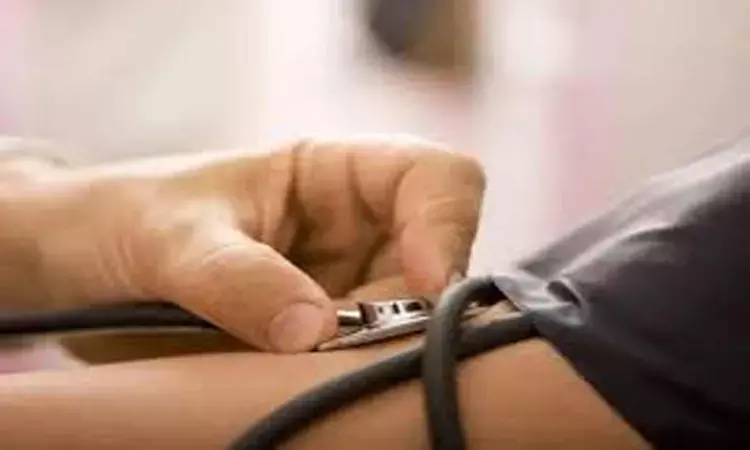- Home
- Medical news & Guidelines
- Anesthesiology
- Cardiology and CTVS
- Critical Care
- Dentistry
- Dermatology
- Diabetes and Endocrinology
- ENT
- Gastroenterology
- Medicine
- Nephrology
- Neurology
- Obstretics-Gynaecology
- Oncology
- Ophthalmology
- Orthopaedics
- Pediatrics-Neonatology
- Psychiatry
- Pulmonology
- Radiology
- Surgery
- Urology
- Laboratory Medicine
- Diet
- Nursing
- Paramedical
- Physiotherapy
- Health news
- Fact Check
- Bone Health Fact Check
- Brain Health Fact Check
- Cancer Related Fact Check
- Child Care Fact Check
- Dental and oral health fact check
- Diabetes and metabolic health fact check
- Diet and Nutrition Fact Check
- Eye and ENT Care Fact Check
- Fitness fact check
- Gut health fact check
- Heart health fact check
- Kidney health fact check
- Medical education fact check
- Men's health fact check
- Respiratory fact check
- Skin and hair care fact check
- Vaccine and Immunization fact check
- Women's health fact check
- AYUSH
- State News
- Andaman and Nicobar Islands
- Andhra Pradesh
- Arunachal Pradesh
- Assam
- Bihar
- Chandigarh
- Chattisgarh
- Dadra and Nagar Haveli
- Daman and Diu
- Delhi
- Goa
- Gujarat
- Haryana
- Himachal Pradesh
- Jammu & Kashmir
- Jharkhand
- Karnataka
- Kerala
- Ladakh
- Lakshadweep
- Madhya Pradesh
- Maharashtra
- Manipur
- Meghalaya
- Mizoram
- Nagaland
- Odisha
- Puducherry
- Punjab
- Rajasthan
- Sikkim
- Tamil Nadu
- Telangana
- Tripura
- Uttar Pradesh
- Uttrakhand
- West Bengal
- Medical Education
- Industry
Heat therapy, an effective and novel treatment for nocturnal supine hypertension: JAHA

Nashville, TN: Patients with autonomic failure and supine hypertension when treated with local heat therapy showed an effective lowering of overnight blood pressure (BP), according to a recent study in the Journal of the American Heart Association. The findings imply that local heat application can be a novel approach for the treatment of nocturnal supine hypertension.
"Long-term safety and efficacy of this treatment in improving nighttime fluid loss and daytime orthostatic hypotension needs to be assessed in the future trials," wrote the authors.
Majority of patients with autonomic failure are affected by supine hypertension which can worsen daytime orthostatic hypotension by inducing pressure diuresis and volume loss during the night and is associated with end-organ damage. In healthy people exposed to heat, sympathetic activation can prevent BP from falling. Considering this Luis E. Okamoto, Vanderbilt University Medical Center, Nashville, TN, and colleagues hypothesized that passive heat had a BP‐lowering effect in patients with autonomic failure and could be used to treat their supine hypertension.
In Protocol 1 with 22 patients, the researcher assessed the acute effects of local heat (40–42°C applied with a heating pad placed over the abdomen for 2 hours) versus sham control in a randomized crossover fashion.
In Protocol 2 (proof‐of‐concept overnight study; n=12), the researchers compared the effects of local heat (38°C applied with a water‐perfused heating pad placed under the torso from 10 PM to 6 AM) versus placebo pill.
Key findings of the study include:
- Protocol 1- Heat acutely decreased systolic BP by −19±4 mm Hg (versus 3±4 with sham, P<0.001) owing to decreases in stroke volume (−18±5% versus −4±4%) and cardiac output (−15±5% versus −2±4%).
- Protocol 2 -- Heat decreased nighttime systolic BP (maximal change −28±6 versus −2±6 mm Hg). BP returned to baseline by 8 am. The nocturnal systolic BP decrease correlated with a decrease in urinary volume (r=0.57) and an improvement in the morning upright systolic BP (r=−0.76).
"Local heat therapy effectively lowered overnight BP in patients with autonomic failure and supine hypertension and offers a novel approach to treat this condition," wrote the authors. "Future studies are needed to assess the long‐term safety and efficacy in improving nighttime fluid loss and daytime orthostatic hypotension."
Reference:
The study titled, "Local Passive Heat for the Treatment of Hypertension in Autonomic Failure," is published in the Journal of the American Heart Association.
DOI: https://www.ahajournals.org/doi/10.1161/JAHA.120.018979
Dr Kamal Kant Kohli-MBBS, DTCD- a chest specialist with more than 30 years of practice and a flair for writing clinical articles, Dr Kamal Kant Kohli joined Medical Dialogues as a Chief Editor of Medical News. Besides writing articles, as an editor, he proofreads and verifies all the medical content published on Medical Dialogues including those coming from journals, studies,medical conferences,guidelines etc. Email: drkohli@medicaldialogues.in. Contact no. 011-43720751


